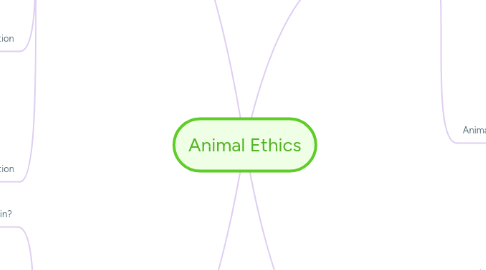
1. Regan
1.1. What's wrong with using animals? Pain?
1.1.1. Veal
1.1.2. Monkey with electrodes in it's brain
1.1.3. Raccoon with its leg in a trap
1.1.4. these are all bad, sure, but they are not the main thing wrong with how we treat animals
1.2. Animals as Resources
1.2.1. The main problem with how we treat animals in farming, medical research, hunting etc, is that it allows us to treat them as our resources
1.2.2. Here for us to be eaten, surgically manipulated or exploited for sport/money
1.3. Animal Rights and Inherent Value
1.3.1. Inherent value = value independent of its usefulness to any other being
1.3.2. It's not the pain and suffering that is wrong
1.3.3. It is that they are being used as though they were mere resources with no inherent value
1.3.4. It is true that many animals lack characteristics that humans do
1.3.4.1. Higher cognitive abilities
1.3.4.1.1. E.g. building a bookcase
1.3.5. What about the idea that animals have inherent value, just less than we do?
1.3.5.1. Hard to find justification that doesn't apply to humans aswell
1.3.5.2. E.g. Less reason, autonomy, intellect
1.4. Central moral consideration is not whether a creature is sentient, or whether it is a person; but whether it is the experiencing subject of a life
2. Brody
2.1. Four elements of pro-animal research position
2.1.1. Animals do have interests
2.1.1.1. At least in not suffering
2.1.2. Adverse effects on animals is morally relevent and must be taken into account
2.1.3. Justification for research that has adverse effects is the benefits to human beings
2.1.4. In deciding whether or not particular research is justified = human interest
2.2. US position
2.2.1. Use minimum number of animals
2.2.2. Consider alternatives
2.2.2.1. e.g. computer modelling
2.2.3. Avoid or minimise animal distress when consistent with sound scientific practice
2.2.4. Use appropriate sedation, analgesia or anesthesia
2.2.5. Kill animals painlessly after research if they would otherwise suffer severe pain or distress
2.3. What sort of greater significance are human interests to be given over animal interests?
2.3.1. Replace animals with other methods
2.3.2. Reduce number of animals used
2.3.3. Refine research techniques to minimise suffering
2.4. EU position
2.4.1. Falls between
2.4.1.1. Equal consideration
2.4.1.1.1. Animal and human interests count equally
2.4.1.2. Lexical Priority
2.4.1.2.1. Human interests, no matter how minor, always take precedence over animal interests
2.4.2. Effectively a discounting view
2.4.2.1. "A unit of pain counts less morally is it is experienced by an animal that it would be is it is experienced by a human being...simply because of the species of the experiencer"
2.4.2.1.1. Blatant speciesism?
2.4.2.2. Is discounting wrong simply because it violates equal consideration of interests?
2.4.2.2.1. Or is it wrong because it is a discriminatory version of discounting, like racism, sexism or homophobia?
2.5. Solution
2.5.1. We have to challenge the whole idea that we are, in general, morally comitted to an equal consideration of interests
2.5.1.1. Ross
2.5.1.1.1. We have special obligations to 'near and dear'
2.5.1.2. Scheffler
2.5.1.2.1. We are permitted to pay special attention to our own interests in pursuing personal projects
3. Singer
3.1. Equal Consideration
3.1.1. No-one would say someone of less intelligence should be given less consideration
3.1.2. Equality is a moral ideal about how we should treat humans, not an assertion of fact
3.1.3. Based on the idea that the interests on one perosn should be given the same weight/consideration as the interests of another
3.1.3.1. will vary according to the particular interests and.or characteristics that different people have
3.2. The idea of equal consideration of interests can be extended to animals
3.3. Sentience is the common characteristic between animals and humans
3.3.1. the capacity to suffer and/or the enjoyment of happiness
3.4. Speciesism
3.4.1. The idea that species membership itself is morally significant
3.4.2. How is this different from racism or sexism?
3.4.3. Maybe based on ability to reciprocate
3.4.3.1. But how do animals differ in this respect from very young children
3.5. Animal Experimentation
3.5.1. Are there morally relevant differences between animals and human infants?
3.5.1.1. Potentially may be one
3.5.1.1.1. but then abortion will be morally wrong as well since the potential of the fetus is virtually the same as the infant
3.5.1.2. Considering a brain damaged orphan of six months vs an animal
3.5.1.2.1. Doesnt seem to be any morally relevant difference
3.5.1.2.2. The main difference is that animals are not members of our species
3.5.2. The claim that they should not be sued is not absolute
3.5.2.1. there are imaginable cases in which experiments would be justified
3.5.2.1.1. but in the real world these are exceedingly rare
4. DeGrazia
4.1. It is clearly justified as it is necessary for medical progress
4.1.1. The moral status of animals compared with humans
4.1.2. In what circumstances the goal of promoting human health justifies harming animals
4.1.3. WHether the current protections for animals are more or less adequate
4.1.4. Whether animals have life interests
4.1.4.1. as opposed to an interest in not suffering
4.2. Much current animal usage is unjustified
4.2.1. Use of animals in research raises ethical issues
4.2.2. Sentient animals (including most vertebrates) deserve moral protection
4.2.3. Many animals (at least mammals) are capable of a wide range of aversive mental states
4.2.4. Animals experimental well-being (quality of life) deserves protection
4.2.5. Humane care of highly social animals requires extensive access to conspecifics
